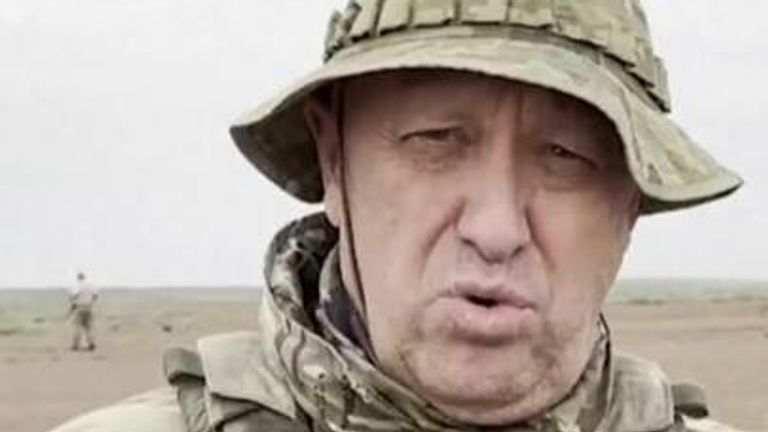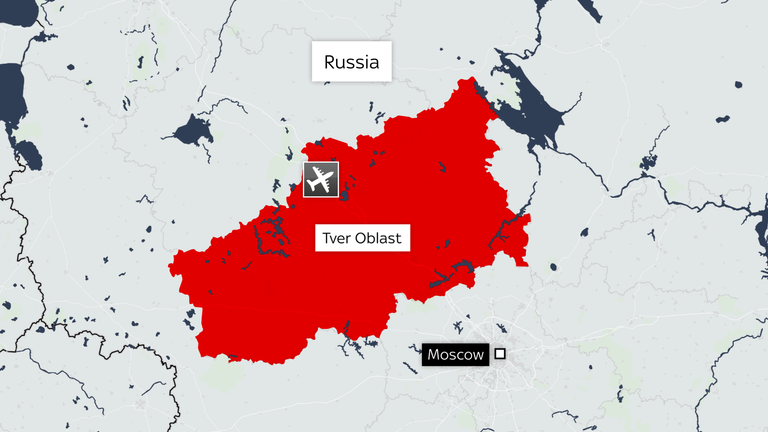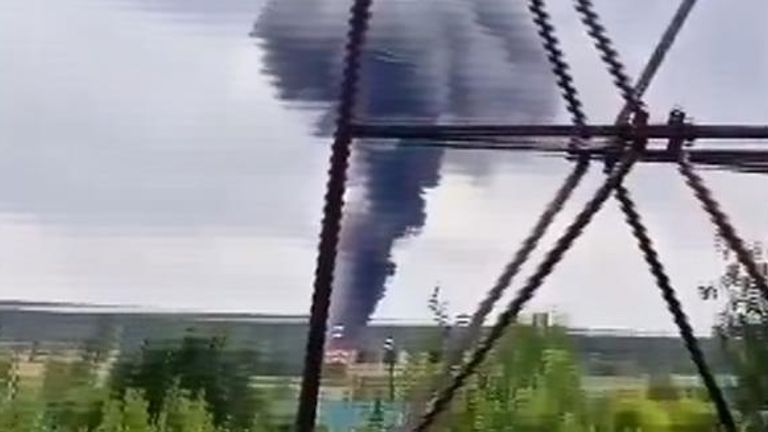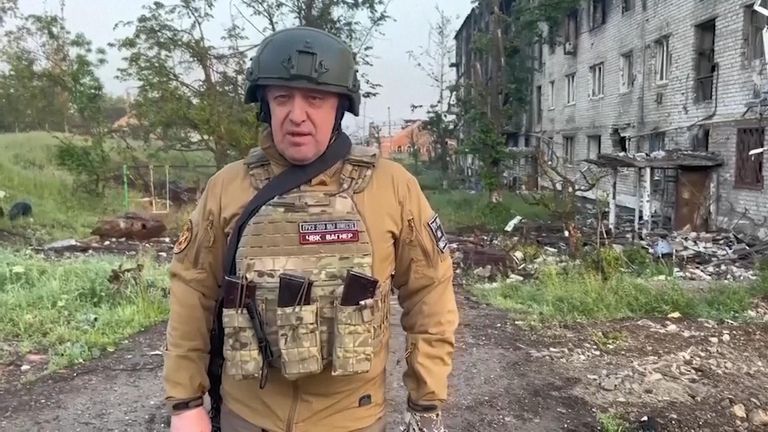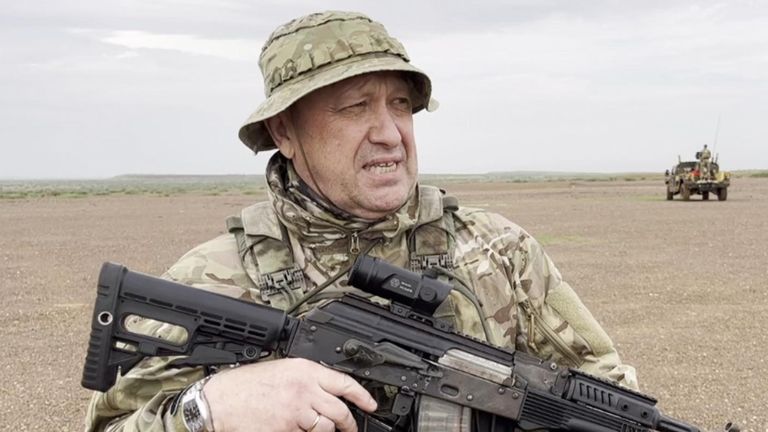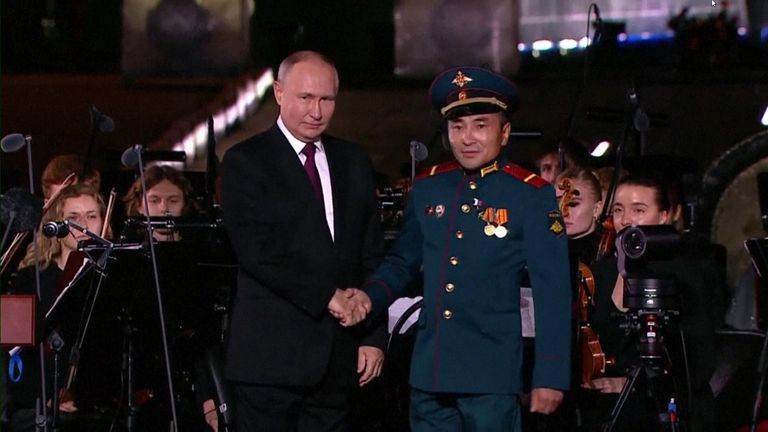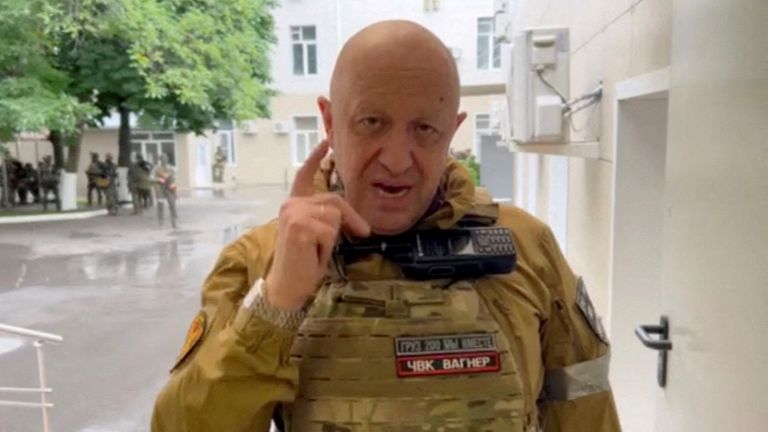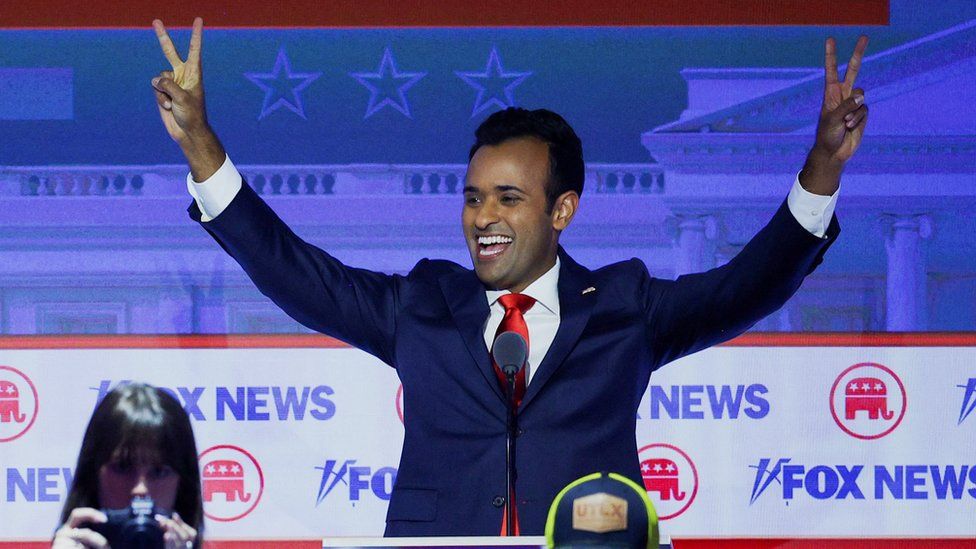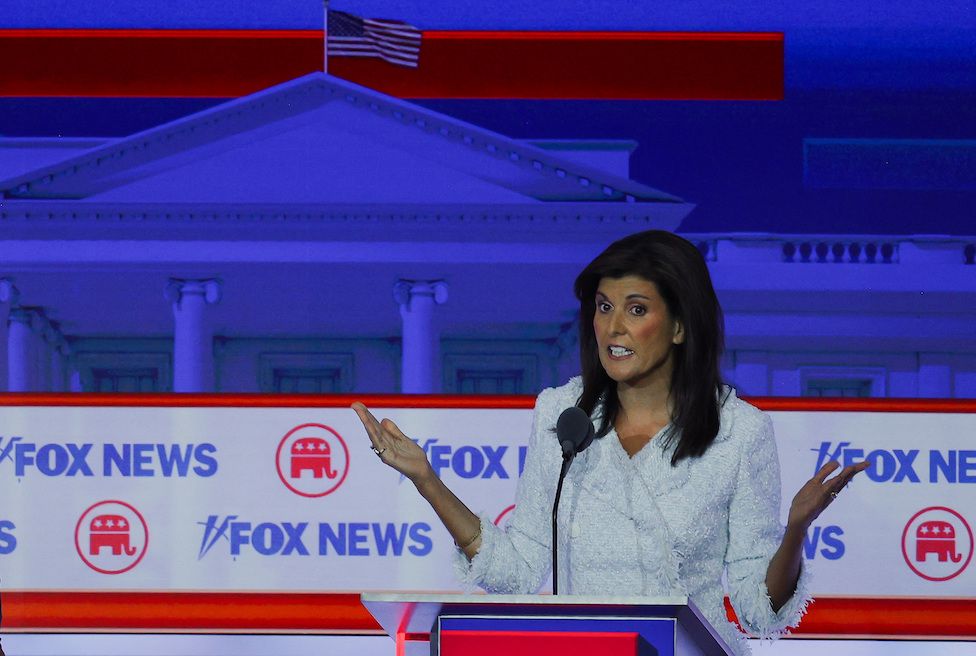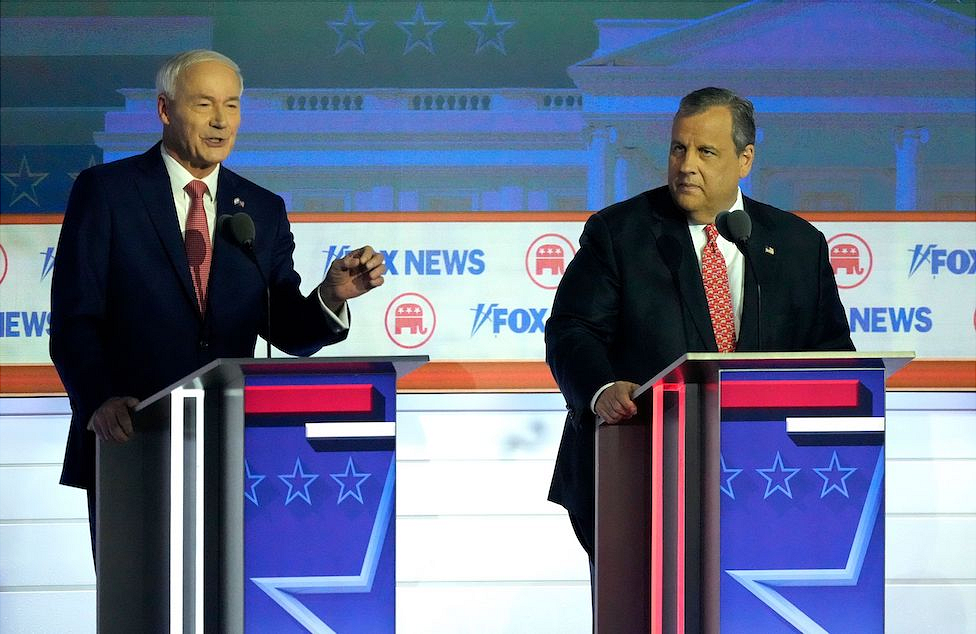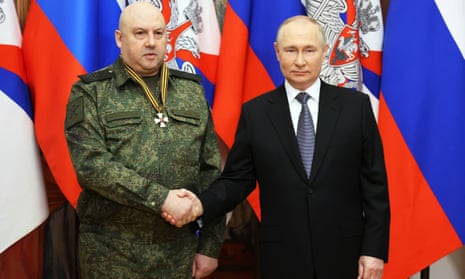A private jet with 10 people on board has crashed in Russia - with the man who led a short-lived mutiny against the country's top brass on the passenger list.
Russian authorities said Wagner boss Yevgeny Prigozhin boarded the flight, though there has been no absolute confirmation of his death.
The Russian news agency Interfax said 10 bodies had been recovered from the site.
Footage from the scene - about 185 miles north of Moscow - shows flames leaping from the wreckage.
Here's what we know so far.
What happened?
A private Embraer Legacy aircraft was travelling from Moscow to St Petersburg when it crashed.
Russian authorities said there were no survivors.
Russian state-owned TASS news agency reported seven passengers and three crew were on board the Embraer aircraft and were all killed.
According to Reuters, there are reports they were attending a meeting with officials from Russia's defence ministry.
A Telegram channel affiliated with the Wagner Group has said Prigozhin was killed in the plane crash. It called him a hero and a patriot who had died at the hands of unidentified people described as "traitors to Russia".
The plane came down near the village of Kuzhenkino Tver - and unconfirmed reports suggest it belonged to Prigozhin.
Who was on board?
A list of those on board has been published by Russia's Federal Air Transport Agency.
Russia's civil aviation authority said Prigozhin was on the passenger list, and later added that he was travelling with Wagner commander Dmitry Utkin.
Utkin was Prigozhin's right-hand man - a shadowy figure covered in Nazi tattoos including a swastika and lightning bolts.
Prigozhin's security chief Valeriy Chekalov was also said to be on the flight - with the other four passengers named as Sergey Propustin, Yevgeny Makaryan, Alexander Totmin and Nikolay Matuseev.
Sky's Moscow correspondent Diana Magnay says that, if the deaths are confirmed: "That is essentially the top echelons of the Wagner Group taken out in one fell swoop - and it is exactly two months to the day that Prigozhin launched his very short-lived mutiny."
The crew members on the doomed flight have been named as commander Aleksei Levshin, co-pilot Rustam Karimov and flight attendant Kristina Raspopova.
What could have caused the crash?
Our military analyst Sean Bell said plane crashes are traditionally in bad weather - and conditions were clear at the time.
Referring to footage of the incident, he added: "This aircraft looks as if it's completely out of control - it's spiralling down, there are vapour trails coming from it - all of which indicates it's had some sort of catastrophic failure in the air."
Magnay says there have been reports of a second plane behind the one that crashed that was zig-zagging through the sky.
Security and defence analyst Professor Michael Clarke says the way the plane came down doesn't indicate there was a bomb on board - but it did look like an aircraft that had been hit by something outside that did enough damage to wreck the controls.
Flightradar24 says data from the aircraft shows it descended sharply about 33 minutes into the flight.
Read more:
Prigozhin's apparent death proves no one is indispensable
Putin's revenge was a dish best served cold
Who is Yevgeny Prigozhin?
Once a close confidant of Russian President Vladimir Putin, Prigozhin founded Wagner - a private military company whose fighters were on the ground in Ukraine.
But in recent months, Prigozhin had been a vocal critic of Russia's defence ministry, as well as top generals, in their handling of the invasion.
He led a short-lived mutiny against the country's top military brass in June - and at the time, he was described by Mr Putin as a "traitor".
The rebellion ended when Belarusian President Alexander Lukashenko stepped in to broker a deal, with Prigozhin agreeing to relocate to Belarus.
What has happened since the rebellion?
Earlier this week, Prigozhin made a video address for the first time since the aborted mutiny.
Wearing camouflage and holding a rifle, he appeared to be in Africa - and talked about Russia making the continent "free".
Prigozhin spoke of how Wagner was tackling terrorist groups in the region, and "making life a nightmare for ISIS and al Qaeda and other bandits".
His mercenary group has been accused by the UN and other agencies of widespread human rights abuses.
Where is Vladimir Putin?
Amid reports that Prigozhin is dead, Mr Putin was attending a concert in Kursk.
The event is dedicated to the 80th anniversary of Soviet troops' victory in the Battle of Kursk.
Soldiers joined the president on stage, with Mr Putin pinning medals on troops.
The Russian president has also been participating in the BRICS summit - appearing virtually alongside leaders from Brazil, India, China and South Africa.
What has been the reaction to the plane crash?
Boris Bondarev, a former Russian diplomat, told Sky News that the death of Prigozhin would benefit Mr Putin.
And Christopher Steele, a former British intelligence officer, said he believed such an incident involving the mercenary chief was "inevitable" following his failed revolt.
Mr Steele claims a contract had been put out on Prigozhin by members of Russia's business community in recent weeks.
Sean Bell has said the crash could be a ploy to let the Wagner boss live peacefully in exile.
"This might have been an engineered story for Prigozhin to slip quietly away and live in exile somewhere, under a wig and with a degree of privacy," he added.
US President Joe Biden, who is on holiday in California, has been briefed.
Adrienne Watson, America's national security spokesperson, said: "We have seen the reports. If confirmed, no one should be surprised."
And Alicia Kearns, who chairs the UK's Foreign Affairs Committee, told Sky News that the speed at which the Russian government confirmed Prigozhin was on the passenger list "should tell us everything we need to know".
Reports have suggested that the plane was shot down by Russian air defence forces, and the British MP says this suggests Mr Putin is "sending a very loud message".
A UK government spokesperson said the Foreign Office is "monitoring the situation closely".
Was this an act of revenge from Putin?
Many see Prigozhin's reported death as a response from the Kremlin to Wagner's brief armed rebellion against the Russian military.
General Lord Richard Dannatt, ex-chief of the British army, told Sky News Mr Putin was "most likely" behind the plane crash.
He added that even if it wasn't ordered by the Russian president himself, "it was by someone who knows what Putin would have wished".
Sky's international affairs editor Dominic Waghorn said "treason does not pay" and "Putin has never tolerated traitors".
"He will hope the presumed assassination will draw a line under that embarrassing mutiny and deter any other threats and that it will bolster his power which has been weakened by the failed coup."
What does this mean for the war in Ukraine?
Prof Clarke says that - if Prigozhin is dead - it will have a "marginal" effect on the conflict, but it will show that Russia is a "gangster state".
He explained: "It is run in a gangster way from the top, right through the very bottom with corruption down at the lowest possible level."
The security and defence analyst expects more details to emerge in the coming hours - and said caution is needed.
"It is not obvious he is dead at the moment, he probably is, but there is still some plausible idea this might be some sort of setup," he added.
The crash has been reported on Russian state television.
https://news.google.com/rss/articles/CBMie2h0dHBzOi8vbmV3cy5za3kuY29tL3N0b3J5L3lldmdlbnktcHJpZ296aGluLXdhcy13YWduZXItYm9zcy1vbi1wbGFuZS10aGF0LWNyYXNoZWQtbmVhci1tb3Njb3ctd2hhdC13ZS1rbm93LXNvLWZhci0xMjk0NjA4N9IBf2h0dHBzOi8vbmV3cy5za3kuY29tL3N0b3J5L2FtcC95ZXZnZW55LXByaWdvemhpbi13YXMtd2FnbmVyLWJvc3Mtb24tcGxhbmUtdGhhdC1jcmFzaGVkLW5lYXItbW9zY293LXdoYXQtd2Uta25vdy1zby1mYXItMTI5NDYwODc?oc=5
2023-08-24 08:37:30Z
2370769932
